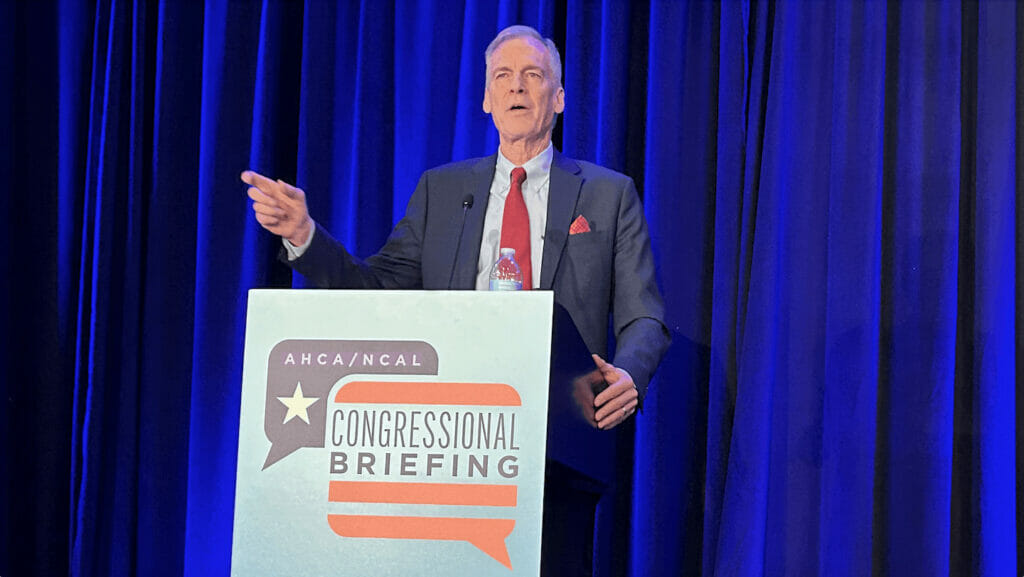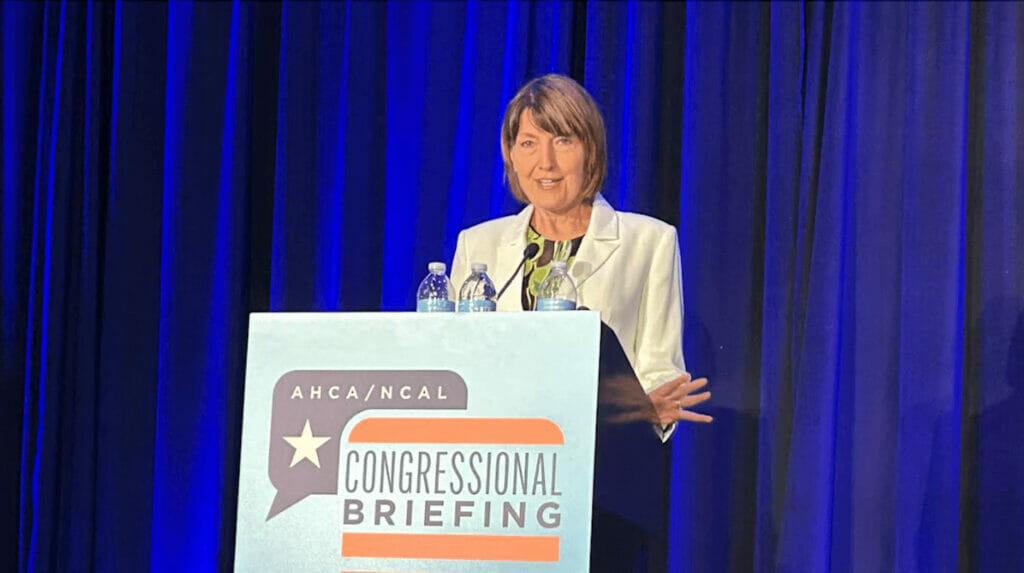
WASHINGTON, DC — More than 500 long-term care providers are in the nation’s capital today to try to head off a minimum staffing rule and win support for legislation that could make recruiting and training workers easier.
Attendance at this year’s American Health Care Association / National Center for Assisted Living Congressional Briefing is record-setting, said President & CEO Mark Parkinson, who praised participants for coming to advocate for their sector at a critical time.
Parkinson noted that a rule setting a first-ever federal nursing home staffing minimum is currently being reviewed by a White House budget office. It should arrive between this Friday and June 21, the last day of spring, he said. Centers for Medicare & Medicaid Services Administrator Chiquita Brooks-LaSure has spoken publicly and specifically about meeting a self-imposed deadline to issue the mandate “this spring.”
At the first general session of the AHCA briefing Monday afternoon, providers picked up a key ally in their efforts to stymie the rule or build in enough flexibility to make it workable.
“The pandemic really brought out the best in our healthcare workers, and as policy makers, as the lawmakers, we need to be focused on what’s goin to make their lives easier — not add to the strain or increase costs or limit access to care,” said Rep. Cathy McMorris Rodgers (R-WA), chairwoman of the House Energy & Commerce Committee, which oversees Medicaid.
“That’s why I do oppose these actions right now that I see coming out of the administration that are threatening to undermine care and safety. We’re going to work on this together.”

McMorris Rodgers described the federal staffing rule, whose details are still not public, as a one-size-fits all requirement that many facilities will not be able to comply with because of nationwide labor challenges.
“For her to stand up and say she’s willing to fight for us on the staffing mandate, that is huge,” Parkinson told his members after McMorris Rodgers’ speech.
In his opening remarks, Parkinson said providers were well positioned to argue the improvements they had made during the pandemic and convince lawmakers to more seriously consider the legislative and financial support they need.
“I think you start out and let people know, ‘We’ve beaten COVID,’” Parkinson said. “We’ve got the tools that we need now. We’re going to continue to beat it. But then they also need to know that the business nightmare is still occurring. And it’s two things: It’s occupancy, which is still not back to where it was, and it’s staffing.”
The sector remains down some 200,000 workers since just before the pandemic, Parkinson reminded. A study commissioned by the association found that the mandate would require an additional 190,000 workers on top of those already missing, at a cost of $11 billion annually.
“The money just isn’t there,” Parkinson added. “For the average nursing home, it’s about $750,000. Do you have $750,000 sitting around to cover this mandate? Our critics think that we’re siphoning this money off … You just need to deliver the message that you care about what’s going on in your buildings. It’s a calling and you’re passionate about it. You’d love to have more staff but they are simply not out there.”
AHCA Board Chair Phil Fogg encouraged providers to look forward to what he predicts will be better times after another two- to three-year slog. While waiting for inflation to recede and workers to come back, providers must continue to work with lawmakers on issues that affect their daily operations.
“In the aftermath of COVID, our previous shortcomings have been exacerbated, staffing shortages in particular,” said Fogg, CEO of Consonus Healthcare & Marquis Companies. “Our main priority is to encourage Congress to make meaningful investments that will help us attract a pipeline of caregivers and protect access to care for our nation’s seniors.”
Today, providers will hear from other AHCA and Congressional leaders before heading up to the Hill to meet with lawmakers and staff.
In addition to raising awareness about the staffing minimum, legislative priorities include the Building America’s Health Care Workforce Act, which would reinstitute a temporary nurse aide program for 24 months; bills in both houses that address the nurse training lock out; and recruiting members to join the bipartisan 21st Century Long-Term Care Caucus.




